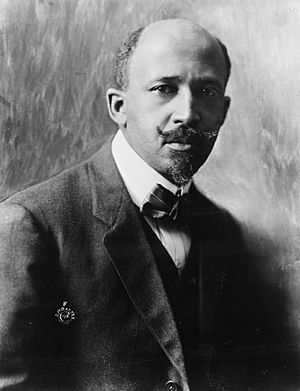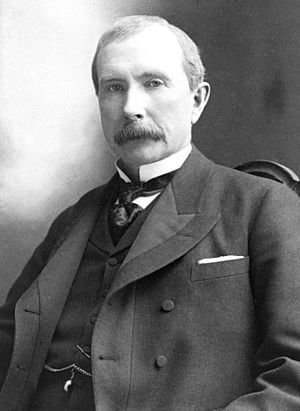The Talented Tenth facts for kids
The Talented Tenth was a special idea about leadership among African Americans in the early 1900s. A famous leader named W. E. B. Du Bois wrote about it in an important essay in 1903. This essay was part of a book called The Negro Problem, which had writings from many important African American thinkers.
Contents
How the Idea Started
The phrase "Talented Tenth" first appeared around 1896. It was used by white people in the North who wanted to help. One group, the American Baptist Home Mission Society, was strongly supported by John D. Rockefeller, a very rich businessman. Their goal was to create Black colleges in the South. These colleges would train Black teachers and leaders.
In 1903, when Du Bois wrote his essay, Theodore Roosevelt was the U.S. president. Industries were growing very fast. Du Bois believed it was a good time for African Americans to improve their place in society.
The "Talented Tenth" referred to about one in ten Black men. These men would become leaders in the Black community. They would do this by going to college, writing books, and working for social change. Du Bois argued that these educated men should use their skills to help and improve the Black community. They should put their community's needs before their own.
He strongly felt that Black people needed a classical education. This kind of education focuses on subjects like history, literature, and philosophy. Du Bois thought it would help them reach their full potential. This was different from the industrial education that Booker T. Washington supported. Industrial education focused more on job skills. Du Bois saw classical education as the best way to make the Black community stronger. He believed it would create smart, well-rounded leaders.
We will only have strong men if we make being a good person the main goal of schools. This means teaching intelligence, kindness, knowledge of the past and present world, and how people fit into it. This is what a higher education should be built on. From this base, we can learn how to earn a living, use our hands skillfully, and think quickly. We will never worry that children and adults might confuse how they live with the true purpose of life.
Later in his life, Du Bois changed his mind a bit. He started to believe that leadership could come from many different places. He thought that efforts from everyday people were also very important for social change. His stepson, David Du Bois, wrote in 1972 that Du Bois believed: "We should look to those who have suffered the most and have the least to lose for strong, reliable, and unchanging leadership."
In his "Talented Tenth" essay, Du Bois wrote:
The Black race, like all races, will be saved by its special people. So, education among Black people must first focus on the Talented Tenth. It is about helping the best people in this race. They can then guide the larger group away from bad influences and dangers.
Later, in his book Dusk of Dawn, Du Bois explained his idea again. He said that his earlier idea was for a small group of talented people to lead the larger group. But he added that the power of these talented leaders should come from their knowledge and good character, not from their money.
Du Bois's Vision for Improvement
W.E.B. Du Bois believed that educated African Americans should put their community first. They should use their education to make things better for everyone. For Du Bois, using education to improve the African American community meant several things.
First, he thought the "Talented Tenth" should try to get important roles in politics. By doing this, Black communities could have their voices heard in the government. Having Black people in politics would allow these educated leaders to take "racial action." This meant they could work to solve problems like segregation. Du Bois believed that having African Americans in government would start the process of ending segregation.
Second, he also thought that education would help people start businesses. These businesses would improve the money situation for Black communities. Du Bois believed that success in business would not only help financially. It would also encourage white people to see Black people as more equal. This would help lead to integration, allowing African Americans to join the main business world.
Changing the Idea
In 1948, W.E.B. Du Bois updated his "Talented Tenth" idea. He called the new version the "Guiding Hundredth." He wanted to make the idea more open and fair. He suggested forming friendships and working with other minority groups. These groups were also trying to improve their lives. The "Talented Tenth" mainly focused on problems faced by African Americans. But the "Guiding Hundredth" would also help solve problems for other minority groups.
Du Bois also stressed the importance of good character and kindness. He wanted the leaders of these communities to be selfless and caring. So, when it came to choosing leaders, Du Bois put good morals above just having an education.
The "Guiding Hundredth" challenged the idea that only a few special people could save African Americans. It changed the idea of Black leadership. It brought together ideas about race, culture, politics, and money. Du Bois still tried to keep the idea of education important. He saw education as a way for everyone to find new opportunities. However, some people saw this change as a step backward. They thought it might bring back old ways of thinking and still promote the idea of an elite group. This updated idea was also Du Bois's way of creating a plan for African Americans after the war. He wanted to strengthen their "ideological conscience," meaning their strong beliefs and values.
Du Bois emphasized working with other minority groups to promote equality for all Black people. Both "The Talented Tenth" and "The Guiding Hundredth" showed that a plan for political action was needed. This was important to keep speaking to many Black people. For Du Bois, Black people's ability to express themselves in politics was the best way for Black culture to show itself. He believed that gaining freedom meant separating Black and White cultures. He thought the cultures could not mix if Black people wanted to protect their unique spirit.
Is it Possible?
To be part of this "Talented Tenth," an African American had to go to college. Many people think this requirement is hard for many African Americans to achieve. The percentage of African Americans in college is much lower than the percentage of white people. There are several reasons for this difference.
Some people say that government policies cause this difference. For example, money help for college students from low-income families went down in the 1980s. This happened because people started to think that money problems were a thing of the past. Not having enough money for college can stop someone from going to higher education. Since many Black and African American families are low-income, they often face this problem.
Also, because many African Americans are in low-income families, their children often go to public schools that do not have much money. When schools do not have enough money, they often provide a poorer education. This makes it harder for students to get into college. These schools also often lack resources that can prepare students for college. For example, schools with little money may not have college guidance counselors. Many private and well-funded public schools do have these counselors.
Because of these reasons, some argue that Du Bois's plan for the "Talented Tenth" is not easy for everyone to reach.
See also
In Spanish: El Décimo Talentoso para niños
 | Bayard Rustin |
 | Jeannette Carter |
 | Jeremiah A. Brown |



